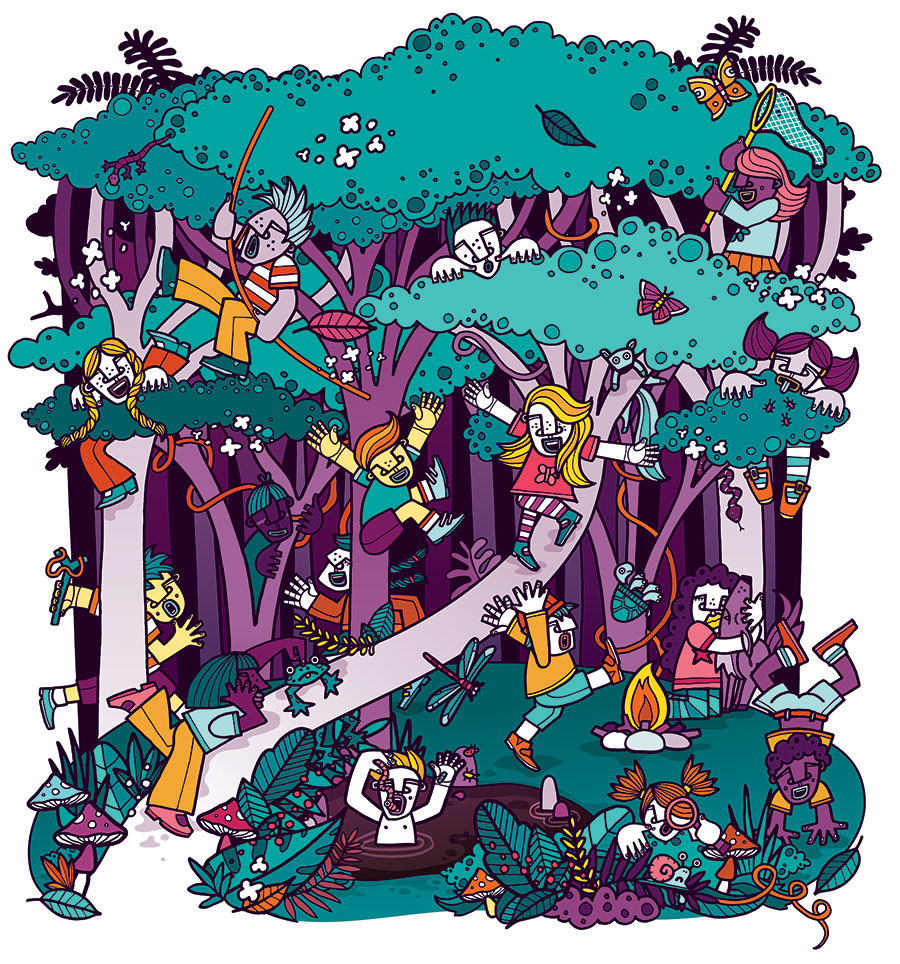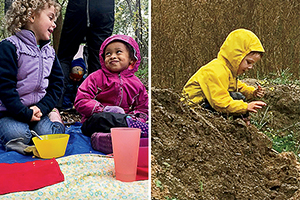
Three-year-olds running wild through the woods. Setting fires. Building stuff out of branches. Rumors were rampant about the Forest Playschool and Fraternal Forest, one an outdoor preschool and the other a weekend adventure camp for elementary schoolers. Both operate year-round in Walking Stick Woods, a 12-acre parcel in the vast Chicago Park District expanse at Pulaski and Peterson known as North Park Village. They close only if there is a severe storm or if the temperature drops below 15 degrees.
Residents of nearby Hollywood Park wanted answers about what exactly was going on, so in March the park district held a community meeting to field questions and tamp down alarmist rumors. Kristin Brock, environmental education manager, hadn’t even finished her opening remarks to the 200 attendees when Janita Tucker, who lives opposite Walking Stick Woods, took the floor. Tucker began to read a letter from “Residents Living Adjacent to NPV,” listing complaints about the open fire, an accumulation of junk, and a lack of appropriate licenses. Two neighbors guarded Tucker, waving their arms at anyone who tried to take back the floor, until finally someone unplugged it.
Forest schools — along with variations such as nature schools and so-called wildschooling — are a trend in early childhood education, complete with their own hashtags on Instagram. Click on one, and up will pop tens of thousands of pictures of children covered in mud, making crafts out of bark, and eating lunch while surrounded by snow. Inspired by traditional European outdoor preschools, these programs are, in large part, a backlash to helicopter parenting and overly structured, tech-oriented teaching environments. In the Chicago area, the Forest Playschool is one of five such programs, with the rest sprinkled in Batavia, Wheaton, Aurora, and Glencoe.
North Park Village Nature Center volunteer Teresa Weed created the Forest Playschool five years ago as a once-a-week pilot after kids had a ball on a field trip to Walking Stick Woods. Its MO: engage kids with nature through gardening, animal watching, art projects, and free play. Now full-time and under contract with the park district, the school doesn’t have a set curriculum; on any given day, kids might choose to perform plays, make ice sculptures, or create ceramics out of clay they dig onsite. “There is always so much to explore in the forest,” says Weed, who trained at Cedarsong Way, a program for forest school teachers in Washington State. (Yes, there is a forest school for future forest school instructors.) Fraternal Forest, also under contract with the park district, started three years later for older kids.
Rights to the tract known as North Park Village have long been a source of neighborhood conflict. The 160 acres were once home to a tuberculosis sanatorium, but when that closed in 1974, preservationists fought City Hall over a bid to sell the property to developers. After a lengthy battle that ran through five Chicago mayors, Hollywood Park residents won by partnering with the nonprofit Openlands. An easement ensured that 108 acres would remain undeveloped until 2064. (The existing buildings were converted into senior housing, a school for the developmentally disabled, recreation facilities, and the nature center.) “Before the school, Walking Stick Woods was an unmanaged area that very few people used,” says Fraternal Forest cofounder Sol Hinami-Mayorga. “I think the neighbors felt it was their secret, so they resent the presence of other people.” (Indeed, one man at the community meeting yelled, “Those are my private woods!”)
The complaint letter presented in March pays tribute to the neighbors who originally fought the city to save the land, but Tucker is the only person willing to publicly back it. (Others have complained anonymously.) “I’m not anti-kid,” says Tucker, who serves as executive director of the Peterson Pulaski Business & Industrial Council. “I’m not one of those keep-off-the-grass people.” Still, she echoes the letter’s concerns: that the programs violate the easement; that kids are building fires in the woods; that the preschool isn’t licensed with the Department of Children and Family Services; and that, at $8,625 a year, it’s prohibitively expensive.
The Forest Playschool families say that it’s hardly the Lord of the Flies scenario the letter suggests. “Walking Stick Woods is clearly marked as a nature study area, so there is no violation on the easement,” says Matthew Mitchell, a lawyer who is representing the Forest Playschool. He also sends his child there. “Both groups have valid contracts with [the park district]. And while critics act like kids are building bonfires, there is one small portable fire pit that is always supervised and then removed from the woods when the school is over. All junk, left by anyone, has been removed.” As far as credentials, the Forest Playschool holds a city license and an insurance policy. And though it has no DCFS license, it does have a working agreement with the agency. “DCFS preschool licensing is building related, with questions like, ‘How old is your roof?’ ” says Mitchell. “Things that don’t apply to us.” Tuition at nearby preschools is similar, if not higher, with Sauganash Montessori School running $8,370 and Chicago Waldorf School $14,420.
Tucker and other naysayers are pushing for the school and camp to be shut down and for a playground to be built in the northwest section of North Park Village — as far from Walking Stick Woods as possible within the park’s boundaries. But officials seem to be tiring of the fight. “We aren’t holding another community meeting,” says Amaris Alanis-Ribeiro, director of the nature center. Margaret Laurino, outgoing 39th Ward alderman, issued a statement saying she supported the programs “as long as they adhere to the contract [with the park district].”
On a recent Saturday, an open house at the Forest Playschool brought dozens of newly interested parents. Children, bundled in down coats and heavy-duty boots, splashed through mud puddles and raced up a wood chip pile. Running free — but not wild.



